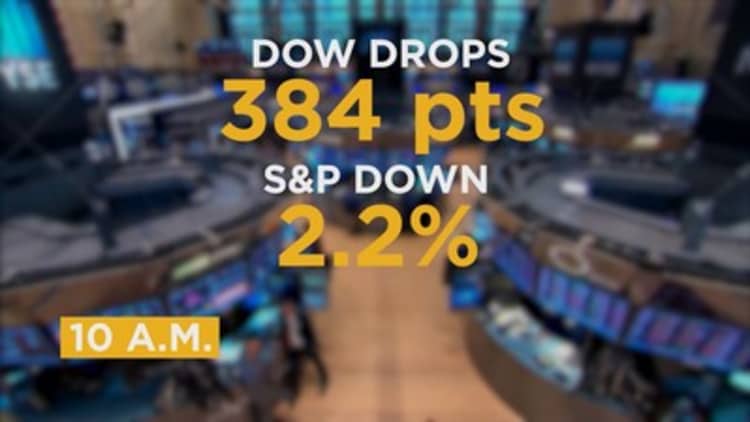
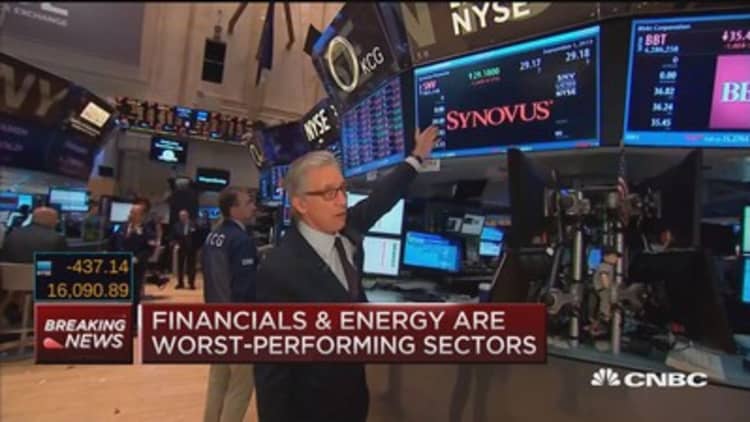
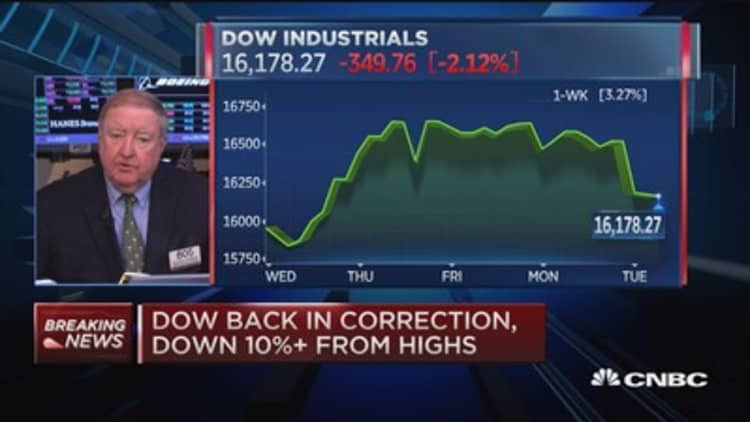
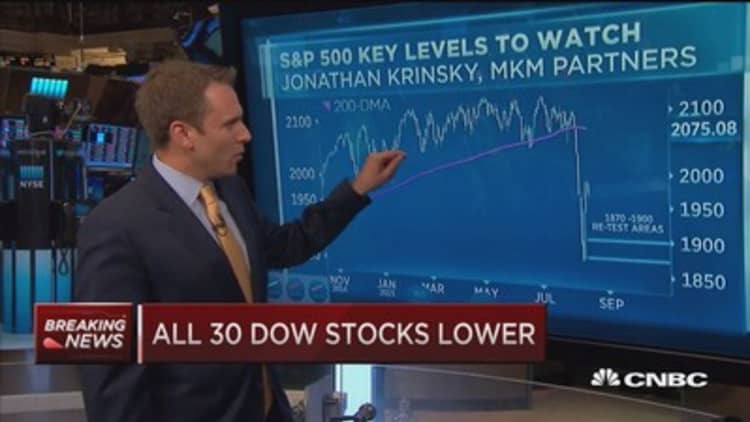

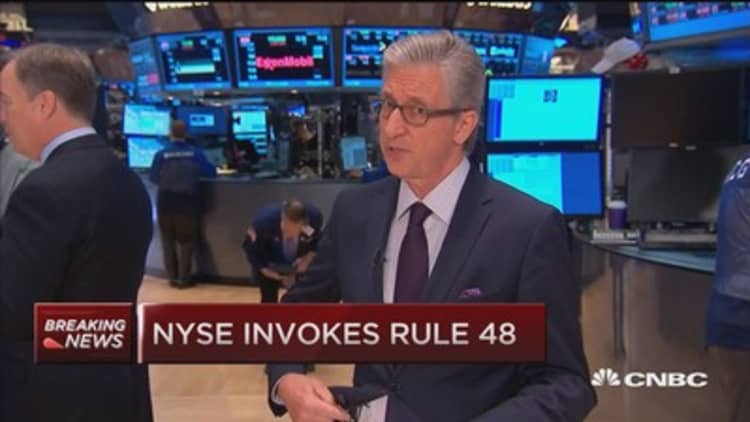
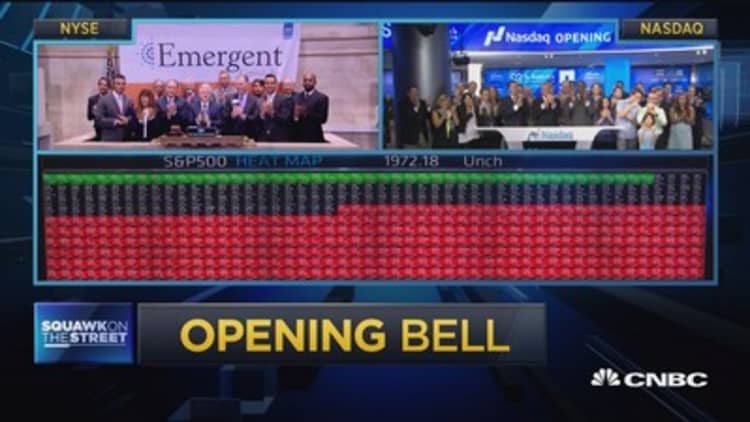
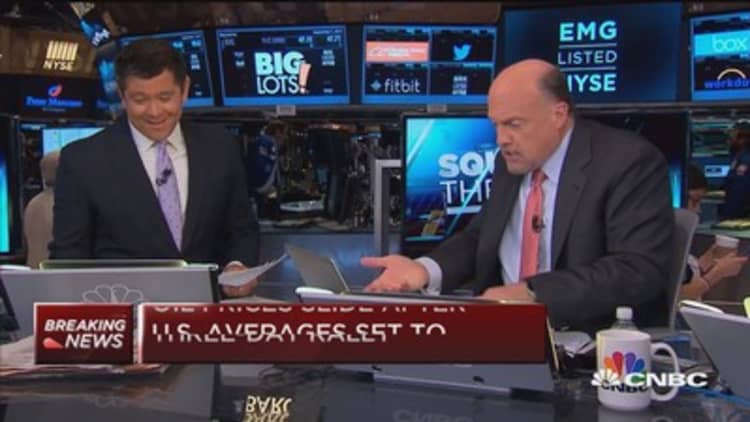
U.S. stocks plummeted Tuesday as continued signs of weakness in China and concerns about the Federal Reserve weighed heavily on investor sentiment. (Tweet This)
The major averages ended in correction territory, down nearly 3 percent in their third-largest daily decline for 2015. Stocks failed an attempt to cut losses in choppy trade prior to the close.
In their worst start to September in 13 years, the Dow Jones industrial average and S&P 500 had their worst first trading day of a month since March 2009. The Nasdaq had its worst first trading day of a month since October 2011.
[Programming note: CNBC will air a special at 7 p.m., ET on the markets]
The Dow closed about 470 points lower, off session after falling as much as 548 points. The Nasdaq composite wiped out gains for 2015, joining the other averages in the red for the year so far.
"Today is just a continuation of last night's sentiment, plain and simple. Concerns continue to erupt about China's economy and the growth (as well as the) decline in energy and WTI today," said Ryan Larson, head of equity trading at RBC Global Asset Management (U.S.).
Crude oil settled down 7.7 percent, down $3.79, at $45.41 a barrel, giving back much of Monday's 8.8 percent surge.
Traders also continued to digest policymaker comments and U.S. data that could impact the timing of a rate hike.
"I think that is clearly the center of the weakness but I don't know why people expect China to get any better," said David Kelly, chief global strategist at J.P. Morgan Funds. "China has its problems but it's not a big driver for the U.S. or earnings of U.S. corporations."
"Nothing happened yesterday to affect the people's perceptions of the Fed," he said.
Other analysts attributed the volatility to a hawkish read on Fed Vice Chair Stanley Fischer's comments over the weekend ahead of Friday's key jobs report and the FOMC meeting later this month.
"The markets were counting on him to be more dovish and he wasn't. That in conjunction with the weak PMI (in China)" pressured stocks," said Krishna Memani, chief investment officer at Oppenheimer Funds.
Earlier, stocks extended losses in afternoon trade after Boston Fed President Eric Rosengren said in a speech that the central bank's jobs target to raise rates has largely been met, but that its inflation target is not as clear cut. Rosengren is a nonvoting member.
"Regardless of whether you're a voting member or not, if you [say] September's on the table, that's going to, in part, drive us lower," said Art Hogan, chief market strategist at Wunderlich Securities.
Two sets of key Chinese data disappointed traders on Tuesday. The official manufacturing purchasing managers' index (PMI) edged down to 49.7 in August from 50 in July, while the final Caixin/Markit manufacturing PMI came in at 47.3 in August, the lowest reading since March 2009.
Read More These battered stocks are China-proof
Even more worrying, China's services sector, which has been one of the lone bright spots in the sputtering economy, also showed signs of cooling, a similar business survey said.
"Services PMI was a little weaker than expected," said Ben Pace, chief investment officer at HPM Partners. He noted that many analysts were expecting the services sector to offset weakness in the manufacturing sector.
"I think it's continuation of the volatility we've been seeing. Our thought is this kind of volatility (is present) particularly because we're in the summertime. We're also in a news vacuum. No (major) earnings out there," Pace said.
The CBOE Volatility Index (VIX), widely considered the best gauge of fear in the market, has held stubbornly high near 30 since last Monday's plunge in stocks. The index approached 33 in the close.
"Granted, volatility tends to be more negative than positive in markets in general," said Randy Frederick, managing director of trading and derivatives at Charles Schwab.
After the Dow futures fell more than 400 points ahead of the opening bell, the New York Stock Exchange invoked Rule 48 for the fourth time in two weeks.
The Chinese PMI data added to ongoing jitters about the world's second-largest economy, which led to the worst month for more than three years in August for the .
In U.S. economic news, the fell to 51.1 from 52.7 the prior month for its weakest read in over two years, according to Reuters.
Read MoreRocky month, US data in focus
"US manufacturing is obviously being impacted by what is going on overseas combined with the stronger dollar and weakness in the oil patch," Peter Boockvar, chief market analyst at The Lindsey Group, said in a note.
"While the US economy is very internally dependent in terms of growth, it is certainly not immune to softness outside (there will not be decoupling) and we know has been growing only modestly for years anyway because of very low productivity growth and only moderate wage growth," Boockvar said.
Construction spending increased 0.7 percent in July.
Three major U.S. automakers beat their sales estimates for August. The gains contributed to a total seasonally adjusted annual rate of 17.81 million, the highest rate since July 2005, according to Autodata.
Reporting before the bell, Dollar Tree earned an adjusted 67 cents per share for its latest quarter, beating estimates by 5 cents. However, revenue and a same store sales increase of 2.7 percent were both below analyst estimates. The stock closed down about 8.7 percent.
In Europe, equities accelerated selling after the weak Chinese data, with all major bourses in the region down about 2 percent.
Asian stocks also slumped on the first trading day of September, with Japan's Nikkei 225 index posting a near 4 percent loss into correction territory, after surveys of China's mammoth manufacturing sector showed a further loss of momentum in the world's second-biggest economy.
Read MoreTokyo shares lead declines as China PMIs sour mood
"China hit the global markets and we followed suit," said Peter Cardillo, chief market economist at Rockwell Global Capital. Markets will "continue this way until we get the FOMC out of the way. ... I still think we have bottomed even with a decline like today."
The major averages are still several percentage points above the lows hit last week.
The Dow Jones industrial average closed down 469.68 points, or 2.84 percent, at 16,058.35, with Apple leading all blue chips lower.
The closed down 140.40 points, or 2.94 percent, at 4,636.10, with energy plunging 3.66 percent to lead all 10 sectors lower.
The Nasdaq closed down 58.33 points, or 2.96 percent, at 1,913.85.
All the U.S. major averages are in correction, more than 10 percent off their 52-week intraday high.
About five stocks declined for every advancer on the New York Stock Exchange, with an exchange volume of nearly 1.6 million and a composite volume of 4.3 billion in the close.
Read MoreEarly movers: AAL, DAL, FDX, FCX, AAPL, VRX, CMG & more
The dollar traded mildly lower against major world currencies, with the euro near the highs of the day above $1.13, and the yen slightly stronger near 119 yen against the greenback.
Treasury yields held lower, with the 10-year at 2.16 percent and the 2-year at 0.71 percent.
Gold futures for December delivery settled up $7.40 at $1,139.80 an ounce.
—CNBC's Gina Francolla and Giovanny Moreano contributed to this report.
On tap this week:
Tuesday
Earnings: H&R Block, Qihu 360 Tech, Bob Evans
Wednesday
Earnings: Vera Bradley, Five Below
8:15 a.m.: ADP Employment report
8:30 a.m.: Productivity & Costs
8:30 a.m.: Gallup U.S. job creation index
10 a.m.: Factory orders
2 p.m.: Beige Book
Thursday
Earnings: Medtronic, Campbell Soup, Ciena, Joy Global, Lands' End, Cooper Cos.
7:30 a.m.: Challenger Job-Cut report
8:30 a.m.: International trade, jobless claims
10 a.m.: ISM non-manufacturing index
10:30 a.m.: Natural gas inventories
11 a.m.: Oil inventories
9 p.m.: Minneapolis Fed President Kocherlakota speaks at forum in Missoula, Montana.
Friday
8:10 a.m.: Richmond Fed President Lacker speaks on the case against further delay
8:30 a.m.: Nonfarm payrolls
3 p.m.: Treasury Strips
More From CNBC.com:





